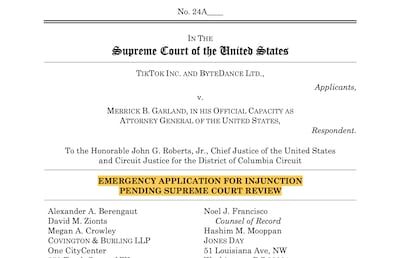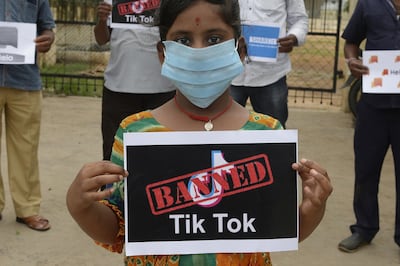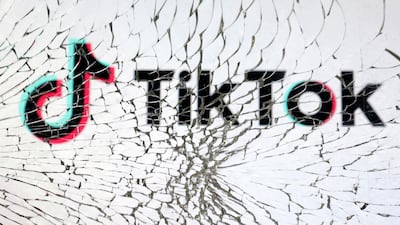In its appeal to the US Supreme Court, TikTok and its parent company ByteDance, used the word “unprecedented” on seven different occasions throughout the filing to try and stay alive in the country.
Yet, simply using the word unprecedented doesn’t make it so.
TikTok has been down this road before, though you won’t find anything about it in recent court filings.
Before I explain, I should first start by saying I wouldn’t exactly call myself a prolific user of TikTok, although I avidly post and peruse the popular app in my capacity as Future Editor for The National to stay up to date on the latest social trends.
Since 2022, I’ve only posted 25 videos to the video-sharing platform that mixes in music, filters and dizzying transitions. That pales in comparison to TikTok's countless loyal users who have helped send it to stratospheric levels of success.

Yet a video I posted in 2022 brings the company’s current legal predicament and strategy for survival full circle to some extent.
I was on vacation in India, visiting Sikhism's holiest site, the Golden Temple in Amritsar, Punjab.
Shortly after visiting, I posted a quick video of the temple just before the sun came up to TikTok.
A few days later, I was somewhat surprised to learn the video only had 20 views, whereas normally, even my most mundane content would have at least 500 views.
Then, it occurred to me in a somewhat embarrassing moment as a technology reporter and Future Editor, that I completely forgot that TikTok had been banned in India since 2020.
I’m not sure exactly how I was able to use the app, but the video I posted on that day was the digital equivalent of a tree falling in the forest with nobody around to hear it, no noise was heard.
Much is often made about the US being TikTok’s most lucrative market with more than 170 million monthly active users. The social platform’s unique algorithm keeps users hooked and there’s little, if any churn in terms of people deactivating accounts.
Several years ago, however, India, not the US, was TikTok’s top prize with more than 200 million monthly active users and a relatively successful creator economy.
So when border tensions between India and China prompted a bigger discussion about user data and national security in the country, there was a lot of sceptism that TikTok would be banned as a result given the platform's popularity.

That scepticism was soon met with swift reality when India’s Ministry of Electronics and Information Technology banned TikTok and 59 other apps over concern about data being stored on overseas servers.
TikTok has repeatedly denied accusations both in India and the US, that user data is compromised, but all that aside, the company has also been adamant that ultimately small businesses and content creators will be negatively and disproportionately affected by a ban.
“Estimates show that small businesses on TikTok would lose more than $1 billion in revenue and creators would suffer almost $300 million in lost earnings in just one month unless the ban is halted,” TikTok said in its most recent news release announcing an appeal to the US Supreme Court.
China-based ByteDance argues that on a sheer economic level, TikTok's demise would be devastating for many.
Over the long haul, that simply wasn’t the case in India, with many users and content creators flocking to Instagram and YouTube as alternatives.
There is one difference, though, between the probable coming US ban on TikTok and the ban that was enacted in India, and that is the growing sophistication of the platform and the content creators who have made the most of it.
As of 2024, there’s more of an economic apparatus that allows content creators to make a living on TikTok compared to what existed in 2020. Those who make a living on the platform definitely have more of an argument to make over how they will be affected if it's taken away.
That said, any creator worth his or her salt at this point, probably has a plan to port all of their content on Instagram, which methodically improved in recent years with its Reels features and managed to achieve parity with TikTok.
ByteDance, the Beijing-based owner of TikTok. might actually have a good argument that it's being unfairly targeted.
As I’ve stated before, though the proponents of the legislation that might force the app to be banned say national security is the main motivation, there could also be a hint of jealousy from TikTok’s success that’s probably fueling the law as well, along with subliminal feelings of xenophobia.
TikTok’s hope that the content creators’ support will be more than enough to keep it afloat in the court of law, however, might be ill-conceived.
In hindsight, TikTok's ban in India, the world’s biggest democracy, was hardly cataclysmic for anyone.
Conversely, in the US, even if the ban goes into effect, it might take some time for the app to actually stop working on the millions of smartphones on which it's installed.
Under the current law that’s closely examined by an appeals court, companies such as Apple and Google might be forced to pull the app from their stores, but existing users are likely to keep posting, while the most robust content creators look to diversify on to other social media apps.
If there’s one thing we’ve learned about social media in the past decade, it’s that the users who make or break these social platforms can be very fickle.
I don’t doubt that TikTok values its 170 million US users and content creators, but the real curiosity is how much those users, in turn, value TikTok, and how much they're willing to vocalise their anger.
In the US, TikTok is heavily banking on users lobbying Congress and president-elect Donald Trump to have the ban repealed.
Yet in India, the users simply moved on.
What happens next could determine the future of the world's most influential social platform.



